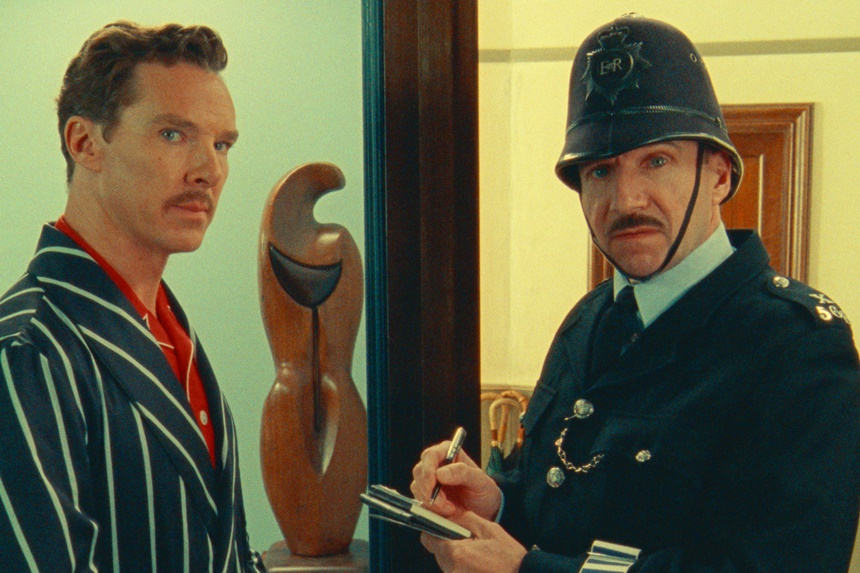The Wonderful World of Henry Sugar, The Rat Catcher, The Swan, Poison: Four Short Films by Wes Anderson Based on Stories by Roald Dahl
⭐️ ⭐️ ⭐️ ⭐️
Run Time: 1 hour 28 minutes (total)
Stars: Benedict Cumberbatch, Ben Kingsley, Dev Patel, Rupert Friend, Ralph Fiennes, Richard Ayoade
Writer: Wes Anderson (based on short stories by Roald Dahl)
Director: Wes Anderson
Streaming on Netflix
Author Roald Dahl (Charlie and the Chocolate Factory) died in 1990. Writer/director Wes Anderson (The Grand Budapest Hotel) made his first movie two years later. Yet it’s hard to imagine two artists — both of whom deceptively wrap layers of whimsy around underlying themes of melancholy — better suited for collaboration.
Anderson has adapted four Dahl stories in a series of Netflix shorts: The Wonderful World of Henry Sugar (37 minutes), followed by The Rat Catcher, The Swan, and Poison (17 minutes each). The first is as charming and heartfelt as any film Anderson has made; the rest venture into some of Dahl’s darkest corners (and, thus, Anderson’s); places where even the indifferent Willy Wonka, the man who cruelly dispatched Augustus Gloop through a pipe to the fudge room, might mutter, “Really, isn’t that a bit much?”
In the tetralogy’s centerpiece, Henry Sugar, Benedict Cumberbatch plays a self-absorbed playboy who discovers a superpower that, while it could enrich him beyond measure, inspires him to become a better person.
Zipping briskly along, Henry Sugar actually tells two stories: Henry’s tale of redemption bookends that of Imdad Khan (Ben Kingsley), a man from India who, through years of concerted training and meditation, develops the ability to see things with his eyes closed.
Stumbling upon a case study written by a doctor who met Khan in Bombay, Henry immediately realizes if he could master the art of seeing hidden things, he’d be free to conquer every casino in Europe. It takes him years, but he finally accomplishes his goal — with unexpected, and heartwarming, consequences.
Even strident fans of Anderson will agree it’s difficult to define exactly what it is actors do in his films. It’s certainly not conventional acting. Typically, Anderson asks his stars to deliver their lines in deadpan fashion, often at machine gun speed, generally expressionless. That’s not to say the actors don’t convey emotion or reveal the inner lives of their characters — they simply exist in a universe where, on a scale of one to ten, the range of human emotions runs from, say, zero to roughly one-and-a-half.
It takes a special kind of actor to limit their emoting while keeping an audience engaged. In this quartet of short films, Anderson veterans Ralph Fiennes (The Grand Budapest Hotel) and Rupert Friend (Asteroid City) are joined by newcomers Cumberbatch, Kingsley, Dev Patel, and Richard Ayoade, all of whom masterfully pull off the Andersonian parlor trick of being both aggravatingly inscrutable and subliminally endearing.
The actors weave in and out of the four films, often taking minor roles, and sometimes appearing in virtually every frame. Fiennes appears in all four segments as a narrator, presumably Dahl, sitting in a cluttered writer’s loft. Although Anderson is credited as the screenwriter, the scripts here consist almost entirely of passages lifted directly from Dahl’s books. That sometimes results in the characters, amusingly, becoming narrators of their own lives. But more importantly, the conceit leaves intact long portions of Dahl’s memorably provocative prose. Dahl might, as he does here, take two paragraphs to describe the arc of a tree branch; or entire sentences to describe the sound of a particular word flowing from a character’s mouth. He is remembered primarily as a master storyteller, but here Wes Anderson reminds us of what a remarkable writer he was, as well.
Both Dahl and Anderson are well aware that bad people can be good company — in small doses. And so, in this collection, the most reprehensible characters are reserved for the three shortest films.
The Rat Catcher introduces us to an absolutely hideous vagrant (Fiennes) who arrives at the adjacent establishments of a rural newspaper editor (Ayoade) and a garage mechanic (Friend) to rid them of unwanted rodents. But the guy is more than a little ratty himself, in ways that become unsettlingly evident as the minutes tick by.
By the time the fellow releases a rat and a ferret inside his shirt in order to demonstrate just how deadly a ferret can be, we’re so far down the Anderson/Dahl rat hole there is no turning back. Fiennes is absolutely brilliant as the rat man; a human itch we just want to keep scratching. Against every ounce of my better judgement, of the four films, The Rat Catcher is the one that sticks with me, which I guess makes it my favorite.
The Swan is a disturbing tale of bullying: Two big kids terrorize a smaller one in the most awful manner, nearly killing him twice for their own amusement. The story is told in typical Anderson fashion, in a sentimental vacuum. Friend plays the child as a grownup, relating his younger self’s ordeal with a detachment that is belied only in the short’s devastating final shot; a reminder that the scars of childhood bullying never truly heal.
Poison is one of Dahl’s most oft-told tales — Alfred Hitchcock directed a version for his 1950s TV series — and like Hitch, Anderson frames the story in his own unique vision. Cumberbatch plays Harry, a British man living in India. One night his roommate, Woods (Patel), arrives home to discover Harry lying perfectly still in bed, sweating nervous buckets. In a panicked whisper, Harry informs his roomie that under his blanket, sleeping on his stomach, is a highly poisonous krait snake. Knowing the snake could awaken at any moment and kill him with one bite, desperate Harry tells Woods to have the local physician (Kingsley), come quickly, and bring a dose of antivenom, just in case.
Anderson’s films seldom raise the stakes as high as they go in Poison: With every passing second, as the doctor toils heroically to save his life, Harry comes closer to possible agonizing death. When the shattering finale finally comes, bringing unexpected waves of relief and horror, we’re left with a sobering observation from Dahl: For some of us, the poison is already coursing through our veins.
You can take your pick of these four Anderson/Dahl gems, but skipping any one of them would be like leaving one piece of your Wonka Bar untouched.
Become a Saturday Evening Post member and enjoy unlimited access. Subscribe now



